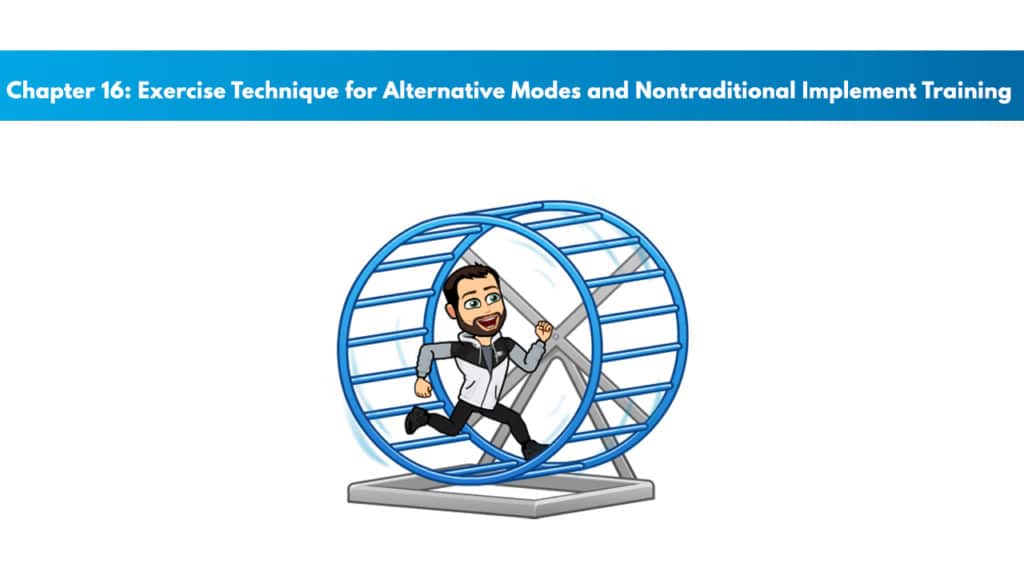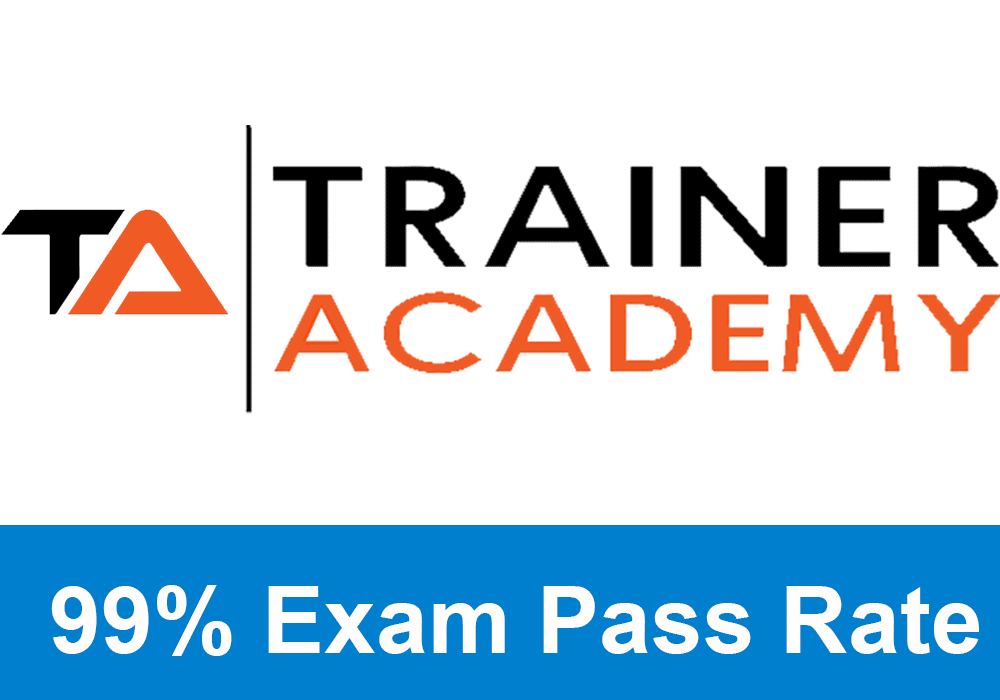
Get your copy of the NSCA CSCS exam cheat sheet. It helps immensely for studying for the exam.
My PTP students report cutting their CSCS study time and effort in half with Trainer Academy.
Benefit from the Exam Pass Guarantee and Retake Fee Guarantee. Plus, take advantage of my current discount code PTPJULY for 35% off the MVP Program (Ends July 15th, 2025).
Try it out for free here to see if it’s right for you, or read my detailed review for further insights.
Chapter Goals:
- Learn the guidelines for performing resistance exercises with nontraditional implements and alternative modes.
- Talk about the limitations and benefits of bodyweight training.
- Determine the limitations and benefits that are associated with core training.
- Determine the correct technique and major flaws with alternative mode exercises.
- Understand how to apply resistance bands and chains to traditional ground-based free weight exercises.
- Understand the correct way to use alternative methods and nontraditional implementation exercises.
General Guidelines
Make sure proper body alignment is found through stable body positions.
If exercising free standing in a ground-based exercise, you should place your feet more than shoulder-width apart and maintain flat positioning on the ground.
Use the right grip based on the exercise type.
Exhale while doing the concentric part of the exercise, and inhale during the eccentric part.
With heavier or lighter loads performed until failure, we use the Valsalva maneuver to maintain the spine’s stability.
Bodyweight Training Methods
Types
- Push ups
- Pull ups
- Chin ups
- Sit ups
- Squat thrusters
- Calisthenics
- Gymnastics
- Yoga
Limitations
Load is limited by the weight of the individual.
No significant effect on absolute strength.
Change reps and movement patterns to increase intensity.
By increasing the reps, you shift from strength to strength endurance.
Benefits of Bodyweight Training
Benefits are specific to people’s anthropometrics.
Includes closed chain exercises.
Several muscle groups are strengthened at one time.
Relative strength is developed.
Body control is improved.
It is a low-cost alternative to other exercises.
Core Stability and Balance Training Methods
Anatomical Focus
The core is the trunk or lumbopelvic region.
The anatomical core is the axial skeleton, and the soft tissues and proximal attachments come from the axial skeleton.
Isolation Exercises
Includes dynamic or isometric action that isolates the musculature specific to the core without the contributions from the lower and upper extremities.
The prone plank or the side plank are good examples.
These exercises don’t have much support for them improving performance in sports.
Free weight ground-based exercise might offer more benefits for sports.
Ground-based exercise gives the core more activation than isolation exercises.
Isolation exercise may be best for people who have suffered some injury.
Exclusive PTP CPT Offers |
||
|---|---|---|
Most Popular Cert | Best Online NCCA Cert | Best Study Materials |
Gold Standard Cert | A Good Option | Best CPT for you?  |
Machine Versus Free Weight Exercises
Stability from machines can target specific muscle groups better.
Stabilizer muscle activation is better with free weights.
Back stabilizer activity was thirty percent lower in the smith machine squat when compared to free-weight squats.
When instability is increased with the performance of ground-based exercise with free weights on unstable places, greater decreases in the production of force, the force development rate, and power outputs have been shown.
There isn’t much need for more instability when exercising with ground-based free-weight moves.
Instability Devices
Devices include inflatable disks, wobble boards, physio balls, hemispherical physio balls, balance boards, foam tubes, sand, and more like these.
Some evidence shows increased core muscle activation with these devices. This occurs along with reduced production of force with the agonist’s muscle.
Force ability may be only 70% of what can be done on stable surfaces.
There is a reduction in the force development rate.
Static balance activities performed on instability devices might be considered intro training steps for improved balance and stability of the core before implementing dynamic and explosive ground-based free weight exercise on stable surfaces.
Olympic lifts are somewhat unstable and better for core stability and enhanced athletic performance than exercises with instability devices.
When in rehabilitation, unstable devices reduce lower back pain and improve the efficiency of soft tissues stabilizing the knees and ankles.
Some studies show instability training reduces ACL injury likelihood.
This training is effective for those coming back from injury for competitive training.
Variable Resistance Training Methods
Types of Resistance
Constant External Resistance is with traditional exercising, like with free weights.
Accommodating Resistance is semi isokinetic, allowing for the movement speed or isokinetic resistance to be controlled in the whole range of motion.
Variable Resistance is on training devices allowing applied resistance to be changed along with the joint angle changes.
Chain Supplemented Exercises
Popular in exercises like the bench press or the back squat.
A training advantage is believed to exist, but this is not substantiated in scientific literature.
Some studies show advantages when added to the bench press.
Determining Resistance
The weight at the top and the bottom are added together and then the average is taken.
If athletes wanted to train a 5 RM load with bench press, they would find their 5 RM without chains. Next, If the 5 RM is 264 lbs, they subtract the average chain resistance from this.
If the bottom is 0 pounds and the top is 24.4 pounds, it averages as 12.2. pounds.
The athlete would add 251.8 – 253.0 pounds to the barbell for appropriate loading.
Applying Chains to Free Weight Exercises
Let them hit the floor from fully extended.
Hang them using lighter chains, thus allowing them to hit the floor at the bottom.
Resistance Band Exercises
There is little research on resistance band use.
Determine Resistance with Resistance Bands
Band Composition can vary based on the type of thermoplastic or elastomer that produced them.
Resistance and tension made by the resistance band are determined based on the stiffness of the band and the level to which the band is stretched.
Exclusive PTP CPT Offers |
||
|---|---|---|
Most Popular Cert | Best Online NCCA Cert | Best Study Materials |
Gold Standard Cert | A Good Option | Best CPT for you?  |
Hooke’s law says the tension from one band equals stiffness times deformation.
3.2 – 5.2% difference between two bands could result in an 8 – 19% difference in mean tension between bands.
The tensions may be predicted by the length of the bands with prediction equations.
Coaches must determine the band’s load at the bottom and the top of the movement and then average the two.
Band tension by color from the lowest to the highest is: yellow, red, blue, green, and black.
Applying Resistance Bands to Free Weight Exercises
The bands can be attached to barbells and the attachment point of a squat rack or heavily weighted dumbbells.
The highest tension and total resistance load is given to the athlete at the position’s top.
At the bottom, the applied load is reduced because the bands are not stretched.
Non-Traditional Implement Training Methods
Includes tires, stones, logs, kettlebells, weight sleds, and other weighted implements.
Strongman Training
- Tire flips
- Log Lifts
- Farmer’s walks
Tire Flipping
Generally, the tire shouldn’t be taller than the athlete’s height due to the added challenge the taller tire.
The tire’s width also affects the flip.
Tire Treads that are worn are harder to grip and bigger treads could have metal or debris in them.
Three Basic Techniques
The sumo is a traditional wider sumo deadlift stance with arms in a narrow grip.
The backlift technique uses a regular deadlift stance and finishes with a forward press motion.
The shoulder against tire technique has the tire on its side, the athlete kneels behind, feet are hip width and ankles dorsiflexed. The athlete places their chin and shoulders onto the tire.
Technique
The Address
Make sure the surface and lifting are good for lifting tires.
Put your knee behind the tire and rest your chin and anterior delts on it.
Grab the tire with a supinated grip and arms extended but not locked out.
Dorsiflex the ankle and lift your knees. Be on the balls of your feet.
Raise your chest and contract muscles within the lower back.
The Lift
Extend knees, hips, and plantar flex ankle while pushing the tire forward and up.
Explode forward toward the tire with two or three steps.
Flex one hip and strike the tire with the quads of the same leg.
Make the hands pronated.
Move the feet forward and extend your arms simultaneously to flip the tire.
Common Flaws, Some Corrections, and Spotting for Tire flips.
Feet too close to the tire can round the back.
Hips may go up faster than the shoulders, like an improper deadlift.
Lifting motions may be used instead of pushing motions.
2 people are needed to spot the movement. They would be on both sides of the lifter. Spotters push the tire when needed.
Log Lifting
Like performing a clean.
Cleans, presses, rows, squats, jerks, lunges, and deadlifts can be performed with logs, too.
Logs are designed to add weight and have a midrange grip to support a pronated grip.
Athletes likely won’t be able to lift the same load as with other, more traditional exercises due to the mechanical disadvantages of log lifting.
Little research is available on this.
Farmer’s Walk
Athletes hold loads at their sides and walk forward.
This involves unstable and awkward resistance with unilateral and bilateral motions.
Farmer’s walk may develop anaerobic endurance, grip strength, and back endurance.
Variable or static loads can be used.
Very little research is available.
Kettlebell Training
Weight with a ball and a handle.
Research shows their usefulness for general fitness or physical development.
The most common movement is the kettlebell swing.
Kettlebell swings do not offer the same cardio benefits as running on a treadmill.
It has been shown to increase muscular strength.
These gains are quite lower than traditional weightlifting.
More often preferred as general prep exercises for traditional weightlifting.
Kettlebell Types
- Cast iron
- Sport
Considerations for Selecting Kettlebells
- Fixed Weight
- Adjustable Weight
- Diameter of the handle
- Spacing of the handle and top of the ball
- The handle’s surface (paint or polished steel)
Unilateral Training
The most common unilateral lower body training exercises are step ups, single leg squats, and lunges.
These can be used to reduce bilateral asymmetries.
Trained people often show bilateral facilitation, and untrained people often show a bilateral deficit.
Modes and Nontraditional Exercises
Bodyweight Exercise
- Front plank
- Side plank
Core Stability and Balance Training Exercises
- Stability ball rollout
- Stability ball pike
- Stability ball jackknife
Strongman Exercises
- Tire flipping
- Log cleans and presses
Other Alternative Exercises
- Back Squat using bands
- Kettlebell swing with two hands
- Single leg squat
- Single leg Romanian deadlift
- One arm dumbbell snatch
Check out Trainer Academy for the best CSCS study materials. They even offer an exam pass guarantee. They have incredible study materials for the CSCS and I have a special limited-time discount for my readers. I also suggest you check out my review on Trainer Academy here.

 Have a question?
Have a question? 



Tyler Read
PTPioneer Editorial Integrity
All content published on PTPioneer is checked and reviewed extensively by our staff of experienced personal trainers, nutrition coaches, and other Fitness Experts. This is to make sure that the content you are reading is fact-checked for accuracy, contains up-to-date information, and is relevant. We only add trustworthy citations that you can find at the bottom of each article. You can read more about our editorial integrity here.